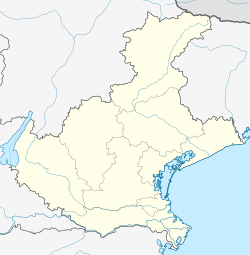Isola Vicentina
Isola Vicentina | |
|---|---|
| Comune di Isola Vicentina | |
| Coordinates: 45°38′N 11°27′E / 45.633°N 11.450°E | |
| Country | Italy |
| Region | Veneto |
| Province | Vicenza (VI) |
| Frazioni | Castelnovo, Ignago, Torreselle |
| Government | |
| • Mayor | Francesco Enrico Gonzo |
| Area | |
| • Total | 26.45 km2 (10.21 sq mi) |
| Elevation | 55 m (180 ft) |
| Population (2010)[2] | |
| • Total | 9,319 |
| • Density | 350/km2 (910/sq mi) |
| Demonym | Isolani |
| Time zone | UTC+1 (CET) |
| • Summer (DST) | UTC+2 (CEST) |
| Postal code | 36033 |
| Dialing code | 0444 |
| Patron saint | St. Peter |
| Saint day | June 29 |
| Website | Official website |
Isola Vicentina is a small town and comune in the Italian province of Vicenza in the Veneto region. Its population is around 9,319.
History
[edit]Numerous archeological finds from various epochs bear witness to the ancient past of Isola Vicentina. These finds include pottery dating back to the Iron Age, a column with an inscription in a Venetian language, a Roman tombstone, and several Lombardic tombs.
It is evident from these discoveries that the territory where Isola Vicentina now lies was already very important in very ancient times. This was due mainly to its geographical position along important roads to Vicenza and Schio.
The earliest written record in which we find Isola Vicentina mentioned dates back to 753 A.D.
During the Middle Ages, the territory was owned first by the bishop, later by the Conti family (until the twelfth century), and finally by the Da Vivaro family. The area was repeatedly the scene of conflict between the powerful ruling families of the day.
All of the territory of Vicenza, including Isola Vicentina, became part of the Venetian Republic in the fifteenth century.
Several centuries of peace followed, to be interrupted only by the arrival of Napoleon’s troops in the late eighteenth century. Isola Vicentina was annexed to the Kingdom of Italy in 1866, along with the rest of the Veneto Region.
Arts
[edit]Villa Branzo Loschi-Drago in Vallugana is an eighteenth-century building that was designed by architect Domenico Cerato.
Villa Cerchiari.
Churches
[edit]- The Isola Vicentina Parish Church is dedicated to St. Peter. It is a very old church, and is thought to have been founded by St. Prosdocimus. It is mentioned in records from as early as the thirteenth century as being the parish church. Throughout the centuries, it has been renovated various times, and was completely rebuilt in the latter part of the nineteenth.
- The Sanctuary of Santa Maria del Cengio is without doubt the most famous church in Isola Vicentina. It is also a very old church. We find it mentioned for the first time in records from the twelfth century, although it probably existed even earlier than that as a shelter for wayfarers and pilgrims.
The church building was renovated and given to the monks at San Brigida in the early fifteenth century. It served to house the monks until the monastery could be built.
In 1462, the Lateranense canons from San Bartolomeo di Vicenza took over the church. The fifteenth-century style of the building has been preserved in spite of the numerous changes that have been made to it.
Twin towns
[edit]Isola Vicentina is twinned with:
 Mühlhausen, Upper Palatinate, Germany, since 1998
Mühlhausen, Upper Palatinate, Germany, since 1998 Marau, Brazil, since 2012
Marau, Brazil, since 2012
See also
[edit]References
[edit]- ^ "Superficie di Comuni Province e Regioni italiane al 9 ottobre 2011". Italian National Institute of Statistics. Retrieved 16 March 2019.
- ^ "Popolazione Residente al 1° Gennaio 2018". Italian National Institute of Statistics. Retrieved 16 March 2019.



